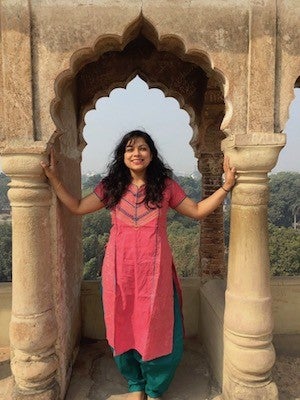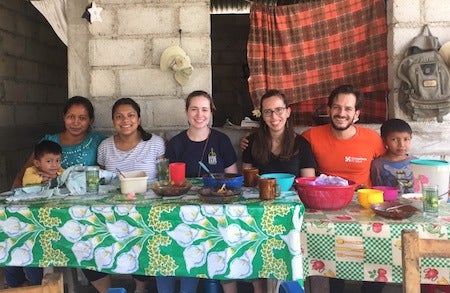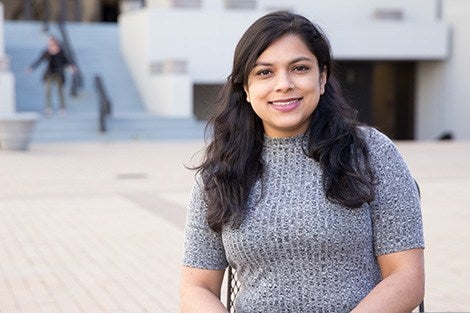Sohini Mukherjee, SM ’18, came to Harvard Chan School to better understand global health problems from a diverse systems-level perspective
May 7, 2018 – During a college research project in the Sundarbans, a poor rural area of India, Sohini Mukherjee asked women whether they felt they were getting support from their husbands, friends, and communities. Her research was aimed at finding out whether psychosocial factors in the women’s lives had an impact on diarrheal diseases in their children.
She did find a link—women who felt more supported socially had children with lower rates of diarrheal diseases.
The research also confirmed something else: It convinced Mukherjee, an English major with a wide range of interdisciplinary interests, that she wanted to pursue a career in public health. She’s slated to graduate this month from Harvard T.H. Chan School of Public Health with a master of science in global health and population.
Interviewing the women in the Sundarbans “was an amazing experience,” Mukherjee said. “A lot of the questions I was asking them, such as ‘Do you feel like you are in control of your life?’, were questions that no one had ever asked them before. At first a lot of the women wouldn’t really talk. But there were others who just wouldn’t stop talking. Seeing the joy in someone being heard—you can only get that from face-to-face interaction.”

She added, “I loved working in a community, working with people at an individual level. I think you can only really understand particular problems in public health when you’ve actually seen them and experienced them.”
But she also wanted to gain the kind of knowledge and experience that would help her analyze health issues from a broader perspective.
The big picture
Mukherjee was born in India but her family moved several times for her father’s job—first to the U.S., then to England, back to India, and eventually to South Africa. Mukherjee returned to the U.S. to attend Chapman University in California, majoring in English literature and psychology. She considered pursuing service-oriented fields, influenced by others in her extended family who had medical careers, such as her grandfather, a doctor. To gain research experience at Chapman, she worked with a professor who studied the links between maternal psychological and physical health and who guided Mukherjee’s research project in the Sundarbans.
While drawn to field work, one of the reasons Mukherjee chose to come to Harvard Chan School was to better understand how to address health problems from a systems-level perspective, taking into account factors such as climate, economics, politics, and social conditions.
In one of her favorite courses at the School—“Foundations of Global Health and Population,” a course co-taught by David Bloom, Clarence James Gamble Professor of Economics and Demography at Harvard Chan School, and Joel Lamstein, founder and president of public health consulting firm John Snow, Inc. and adjunct lecturer at the School—she learned about the real-world difficulties of implementing public health initiatives proposed by academics and policy makers.

Mukherjee also cited a course on spatial methods taught by Marcia Castro, professor of demography at Harvard Chan. Mukherjee studied the role that location, space, and place play in health outcomes—for instance, she worked on a project that looked at links between sociodemographic determinants and clusters of neighborhoods with high levels of childhood blood lead poisoning in 12 U.S. states.
For her master’s thesis, Mukherjee asked to work with Castro, whom she described as a “fantastic mentor.” Her thesis analyzed trends in a recent increase in dengue in Brazil, to see how those trends differed across regions and to determine what factors may be influencing the spikes in the disease, such as temperature or rainfall.
To gain even broader perspective, Mukherjee took advantage of the opportunity to take classes at other Harvard schools. She took a course that focused on corporations’ roles and responsibilities in addressing public health problems at the Business School, studied nonprofit accounting at the Kennedy School, and learned applied data analysis at the Graduate School of Education. In her last semester, she took a public health law class at the Law School.
Mukherjee also volunteered with the Consulting Club at MIT. Working with a small team of Boston-area graduate students, she helped a Harvard MBA student who was creating a startup app to help shift managers and day workers with scheduling and pay—an app that could be particularly beneficial to immigrant populations. Mukherjee enjoyed her consulting gig and the opportunity to network with students from other fields.
The importance of story
From her days as an English major—she is a big fan of Victorian literature and Harry Potter—Mukherjee understood that the best way to get people interested in things is by telling stories. “Even if you have a statistic, you tell the story of what that means in order to get people to actually care about it,” she said.
At Harvard Chan, she channeled her interest in storytelling into her role as managing editor for the Voices in Leadership series. In that capacity, she managed a team of students who wrote blog posts about visiting speakers. The job also gave her the chance to meet those leaders, including 8th Secretary-General of the United Nations Ban Ki-Moon, former U.S. Ambassador to the United Nations Samantha Power, and U.S. Surgeon General Jerome Adams.
Mukherjee says that being at Harvard has helped her see the wide variety of paths she could follow in the field of public health. She previously thought she’d pursue an academic or research career, but now she’s thinking about working in policy, at a think tank, or in the private sector, the latter something she’d never considered before.
“Researchers and scientists do know a lot of different things, but business folks can often point out the gaps—like, for a particular public health effort, how are you going to pay for it?” she said. “How you actually get things done in global health—that’s what I’m interested in.”
photo, top: Sarah Sholes; others courtesy Sohini Mukherjee
